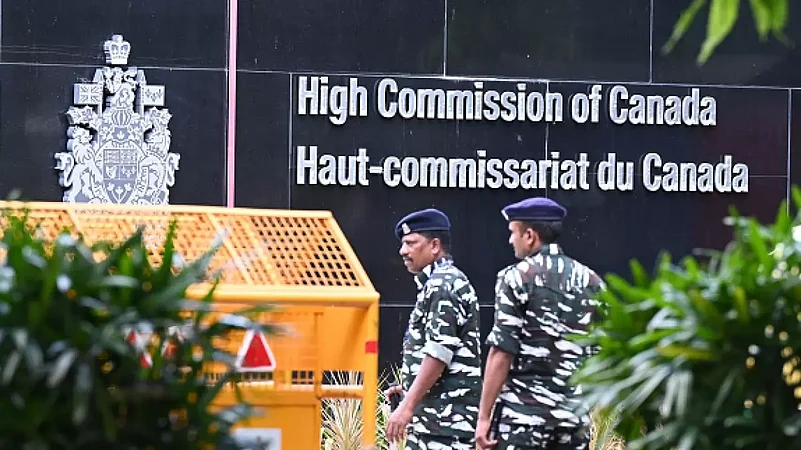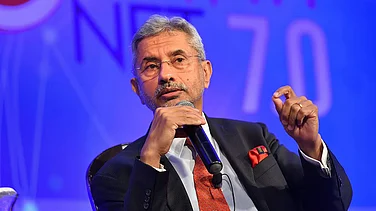While the diplomatic standoff between India and Canada continues to escalate, questions remain hanging over the fate of more than three lakh Indian students who have been living and studying in Canada (as of December 2022), and others who are aspiring to move to the country in the future.
Early last week, Canadian Prime Minister Justin Trudeau made an explosive statement accusing the Indian government of being involved in the killing of Khalistani terrorist Hardeep Singh Nijjar – a claim that India has outrightly rejected, calling it ‘absurd’ and ‘motivated’. Since then, more information has surfaced that the intelligence provided by a 'Five Eyes' ally informed the claim that Canadian Prime Minister Justin Trudeau made about the killing of the Khalistani terrorist.
Amid strained ties, India issued an advisory for its citizens and those who are travelling to Canada to exercise “utmost caution in view of growing anti-India activities and politically-condoned hate crimes and criminal violence" in the country. India has also temporarily suspended its visa services in Canada.
Nearly 2,26,450 Indian students went to Canada in 2022, as per data released by Immigration, Refugees and Citizenship Canada (IRCC). While initial media reports on the diplomatic tensions created panic, this move will most likely not affect those Indian students who are currently in Canada or those who have already availed their visa for travel in the coming months.
“The back and forth statements from both governments accusing each other of hate crimes and anti-national activities has created panic among us. But we are safe here. Student organisations are trying to create awareness about the standoff and how there is no security threat to students as of now,” says Manpreet Kaur, a former student and member of Montreal Youth Students’ Organisation.
However, parents back in India and others on social media worry of the possible impact the diplomatic tensions would have on their dear ones. But Indian students and professors in Canada say that all is well. “I woke up to a number of 'how are you doing' and 'be careful messages'. There seems to be a complete gulf between the Canadian and Indian media coverage of the diplomatic rift. Everything is fine and safe in Canada. Curious if others are also getting similar messages from home,” Ishita Tiwary, an assistant professor said on 'X'.
International students face high costs, housing shortage
Manpreet Kaur moved to Canada two years ago as an international student. She is now residing in Canada on the basis of a work permit. Keeping the current standoff between the countries aside, Kaur says that international students have been struggling to afford inflated prices for accommodation and education in the country.
The average cost of studying in Canada can reach CAD 35,000 (INR 18,84,000) in terms of tuition fees, as per data provided by different education consultation agencies. Coupled with this, the average home price in Canada was around CAD 750,000 (INR 4,62,46,048) as of August.
Just over two weeks ago, nearly 300 international students, who had taken admission in various courses for the session beginning in September at Canadore College and Nipissing University, in Ontario, which share the same campus, were left homeless after the educational institutions expressed their inability to provide accommodation. Students protested on the campus of the Canadore College, demanding housing and better living conditions. They stayed in tents around these universities after authorities claimed that they did not have space to accommodate them.
Under pressure over the rising cost of housing, the Canada government was considering capping the number of foreign student visas, which skyrocketed in the last few years. Last month, Housing Minister Sean Fraser had said, "We've got temporary immigration programs that were never designed to see such explosive growth in such a short period of time.” When asked if a cap could be imposed on the number of foreign students, he said, “I think that is one of the options we ought to consider. However, the government has not made a decision yet,” Reuters reported.
In a statement, Universities Canada, which represents dozens of universities across the country, said tying international students to the country's housing crisis is "deeply concerning".
If the ongoing standoff was to get worse, international students fear that given their existing predicament with regards to accommodation, they would likely get caught in the cross-fire again.
Current diplomatic tensions
Students say that they have not faced any problem in obtaining visas in the past few days. To clarify, currently the ban will affect only those Canadian nationals who intend to visit India, but who do not have an Indian visa yet. This group would include mainly Canadian tourists, business travellers, students, as well as family members of Indian citizens travelling to visit family. There is no ban on study or work visas.
“There is a lot of misinformation being spread about the visa bans. Having said that, if the tensions between the two countries escalate, we do fear that the Canadian Embassy in India might impose a visa ban. But until now, we have had no problems and are not facing any hostilities,” says Varun, a member of the MYSO. Both the governments are using the current situation as an election gimmick and vote bank politics, he says.
However, the recent attacks on Indian students abroad, could have prompted the government to issue an advisory urging its citizens to exercise caution. A 17-year-old Sikh high school student was allegedly “kicked, punched and pepper-sprayed” at a bus stop in Canada’s British Columbia province this month. Earlier in March, a 21-year-old Sikh student from India, Gagandeep Singh, was attacked in British Columbia province by a group of unidentified men who ripped off his turban and dragged him across the sidewalk by his hair. The Consulate General of India in Vancouver strongly condemned the assault on both occasions.
Apart from these incidents of hate crimes, the Indian government has often reacted sharply to demands by Sikh separatists in Western countries for Khalistan, or a separate Sikh homeland.
Over the years, India has been urging countries like Australia, Canada, and the United Kingdom to take legal action against Khalistani terrorists. On the sidelines of several national and international summits, Prime Minister Narendra Modi has raised the issue with these nations' prime ministers, particularly with Canada where Sikhs make up nearly 2% of the country's population.
Sikh protestors in March pulled down the Indian flag at the country's high commission in London, smashed the building's window in protest against the move to arrest Khalistani leader Amritpal Singh. India’s foreign ministry denounced the incidents and summoned the UK’s Deputy High Commissioner in New Delhi to protest the breach of security at the embassy in London.
The build up caused by these incidents along with Trudeau’s latest allegation has plunged ties between India and Canada to a new low. However, Canada has so far not issued any visa ban, meaning that student visas will be given as per rules and regulations. The question of the hour is if Trudeau would want to gamble with Indian students, considering that they contribute over CA$22.3 billion per year to the Canadian economy, based on data from the Standing Committee on Citizenship and Immigration (CIMM) – Immigration and Refugee Board of Canada – basically twice the money that Canadian students contribute.






















